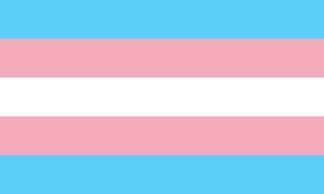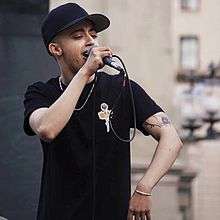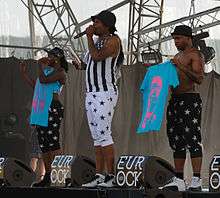Transgender representation in hip hop music
Transgender representation in hip hop music has been historically low. Hip hop has been run predominantly by heterosexual, cisgender people. Often rap music contains homophobic views and anti-gay lyrics. Because of this many LGBTQIA members in hip hop have felt threatened and outcast in hip hop culture. They looked for ways out and discovered by banding together they could create a queer friendly environment within hip hop.
LGBT Hip Hop History
LGBT hip hop (also known as homo hop or queer hip hop) is a smaller subgenre of hip hop music made up of LGBT artists, activists, and performers. The genre first emerged in the 1990s as an underground movement, particularly in California in part as a reaction to the widespread acceptance of homophobia in the lyrics of mainstream hip hop performers (i.e.: Eminem's apparent gay bashing against Elton John).[1] Created as an escape from the extremely homophobic lyrics of mainstream/commercial hip hop, LGBT hip hop offers a safe haven for queer members of the hip hop community to express themselves as well as their identities. LGBT hip hop as a genre is not marked by a specific production style—artists within it may simultaneously be associated with virtually any other subgenre of hip hop, or may also make music that falls outside the genre entirely.[2] LGBT hip hop has continued growing, presently in the 2010s a group of out hip hop musicians, spurred in part by the increased visibility and social acceptance of LGBT people,[3] have produced major tracks and albums, such as Azealia Banks and Frank Ocean,[4] On top of this there has also been a large increase in LGBT-positive songs by heterosexual artists such as Murs, Macklemore, and Ryan Lewis.
Transgender Involvement in Hip Hop

Historically hip-hop has branded itself hyper-masculine allowing only a few female emcees to enter the mainstream game and allowing even fewer longevity and success. Consistent with that image of hyper-masculinity, hip-hop’s militant relationship with homosexuality has been recorded throughout time and if you were gay, then ‘don't ask, don't tell’ was the path many chose.[5] However, that has changed throughout time as society continues to accept and acknowledge the LGBT community more and more. Hip hop is a culture, therefore, it serves as a voice to spread a message. Although hip hop can be used to raise awareness about transgender people, some of the messages transmitted are often negative.
This type of homophobia and rejection can often make not only transgender artists, but also transgender listeners' involvement underrepresented in the hip hop culture. Homophobia has popped up in lyrics and tweets from rappers like 50 Cent[6] and Tyler the Creator.[7] "I'm not homophobic. I just think 'faggot' hits and hurts people. It hits. And 'gay' just means you're stupid. I don't know, we don't think about it, we're just kids. We don't think about that shit. But I don't hate gay people. I don't want anyone to think I'm homophobic," Tyler told NME[8] in an interview after the group the Gay and Lesbian Alliance Against Defamation (GLAAD) said it would be "monitoring his lyrics more closely."[9]
With the rise of the LGBT+ movement in hip hop, artists like 50 cent himself, have apologized for speaking derogatorily or expressing any type of homophobia in the past. In an interview with TheWrap, 50 Cent, who has been accused of making anti-LGBT comments both in and outside of his music, talks about how his mother’s same-sex relationship helped him broaden his outlook. Ending homophobia and transphobia in media is an important step in the fight for equality.[9] However, many argue whether this apology was genuine or if the rapper just wanted to clean his reputation.
Specifically in pop culture there has been areas in which LGBGT members identify themselves within the genre, despite the influence and commodification based on the representation of a heterosexual masculinity. Popular music is an important agent of queer style. Queer style has borrowed from a range of popular music genres such as rock, punk, hip hop, EDM, and pop music.[10]
Transgender Artists in Hip Hop
Lucas Charlie Rose

Lucas Charlie Rose, is a trans-masculine hip-hop recording artist, music producer[11] and the CEO of Trans Trenderz, a non-profit record label for trans hip-hop artists. Originally from France, Rose grew up moving from continent to continent before settling in Montreal, Canada where he received a BFA in Film Production from Concordia University's Mel Hoppenheim School Of Cinema. Before coming out as a trans artist, Rose had already self-produced and released 2 albums and many EPs; in 2014 he decided to start over from scratch with his true identity. He then released the EPs Flyer Than Most, Pride, The Prequel and his debut album R O U G E.
After headlining the Ascension show during the 2016 Philadelphia Trans Health Conference, Rose felt inspired to gather trans hip-hop artists from all around the world to produce an all-trans mixtape: Trans Trenderz. After its live launch in New York City less than 6 months later, Rose announced that Trans Trenderz was now a record label, aiming to bring representation to trans people in the mainstream hip-hop culture. [12]
Katastrophe
Rocco Kayiatos, best known by his stage name Katastrophe and sometimes in later releases as Rocco Katastrophe, is an American hip-hop recording artist[13] Based in the San Francisco Bay Area, he began competing in poetry slams in 1997. After winning the 1998 Youth Speaks poetry slam, he went on tour with Sister Spit's Rambling Road Show tour as a teenager, Kayiatos had poems on four compilation CDs. He often incorporates his identity as a trans man into his work.
Big Freedia

Freddie Ross known for her stage persona Big Freedia, was born in New Orleans, Louisiana and is a popular transgender hip-hop star.[14] Known for being the Queen of the Bounce rap movement, Freedia has changed the game for a once underground hip-hop style. Bounce originated from New Orleans and is all about call and response as well as some "booty-shaking" dance.
Big Freedia began her music career when she was fifteen years old and her mother made her join the local choir. She never missed a practice and by the time she was eighteen she was promoted to being the director. She then continued on her journey through hip-hop and became a back-up dancer for Katey Red another bounce rapper. Her career skyrocketed from her local performances in her hometown and quickly made it big especially after appearance on Treme a HBO series in 2010.
Big Freedia identifies as a he but uses the feminine pronoun "her" when regarding her stage name. The music she produces often has little to do with sexuality and more about having fun. According to her own website she quotes that, "She doesn’t like to be referred to as a gay artist but an artist that happens to be gay."[14]
Other appearances that have contributed to her becoming a big time star includes Jimmy Kimmel Live!, "Last Call with Carson Daly", FADERTV, and PITCHFORK TV.[14] She has bee mentioned in several online articles on websites such as Rolling Stone, OffBeat, and articles from The New York Times. Big Freedia even has her own video game called, "Big Booty Battle" that has also been a success.
Big Freedia’s music includes "Sicon A/V Presents Big Freedia" (2011), "Just be Free" (2014), and "Explode" (2016).
Mykki Blanco

Michael David Quattlebaum Jr., known by his stage name Mykki Blanco, is an artist, rapper, poet, actor, and author. Mykki identifies as multi-gendered and is known for being an avid entertainer in the music industry. Born in Orange County, California, and raised in Raleigh, North Carolina, Mykki decided to run away to New York City at the young age of sixteen years old. There, he/she started cross dressing and was constantly assumed to be a girl.[15] Being cat-called on the city street and receiving sexual attention from males allowed her to continue on her journey as a transgender woman. [16]
D. Smith
D. Smith is a Grammy award-winning producer, singer, and songwriter. Smith is the first transgender woman on Love and Hip Hop, a VH1 realty show. Smith believes the show is a platform that can educated viewers about the transgender community in a positive way.[17]
Smith has worked with artists such as Lil' Wayne, Ciara, Keri Hilson, Lloyd, and Andre 3000. Smith was born in Miami, raised in Brooklyn, and is currently a Buckhead, Atlanta resident. Smith was born male, and despite feeling a stronger female identity at the age of 7, she began her transition in 2014. In an interview with the Atlanta Journal-Constitution, Smith expressed her desire to make a positive impact for the transgender community in her choice to appear on the show, by expressing pride and ownership over being a transgender woman in the Hip Hop community. She believes it allows for more insight and acceptance in the conversations surrounding the transgender community.[18]
D'Lo
D'Lo is a Sri Lankin actor, poet and comedian. D'Lo identifies within the Desi culture, which is uncommon for an individual identifying as queer/transgender within the traditional Desi standards. Desi hip hop is the combination of hip hop music with the Indian subcontinent. D'Lo has expressed the challenge in asserting himself within the hip hop culture, being a female born individual that identifies and performs male. D'Lo became interested in hip hop at young age (pre-teenage years), and began writing poetry about hip hop music at the age of 12. In high school D'Lo also created an all girls dance crew with other Desi south Indian, Pakistani, and Latina members, (at the time D'Lo identified as a gay female). D'Lo explains how the concepts of culture and youth within hip hop helped him deal with racism, and understanding, and developing his sexual identity.[19]
Desi men and women have the ability to negotiate the gender and sexual politics of hip hop. Desi females within the hip hop genre have the ability to conform to, challenge, or sample concepts of the over-sexualized female body in hip hop. By identifying as queer, transgender, and Desi, D'Lo offers alternative forms of sexual expression and identity within the hegemonic expectations of Desi males and females, by providing a queer alternative.[20]
Sasha Sathya
Sasha Sathya is an Argentine artist, singer, musician, producer and songwriter. She is considered the first Latina and Spanish language trans woman rapper to date.[21] Her first single "Wacha" was released in 2015. She is also an openly lesbian sex worker and a Transfeminism advocate and participated touring in many festivals and activities to support the LGBT community fight against transphobia and police persecution and stigmatization on female transgender community.[22] [23]
See also
References
- ↑ "Elton performs with Eminem". Mail Online. Retrieved 2016-05-03.
- ↑ "Is British Rap Finally Going to Have a Gay Hip Hop Scene? | NOISEY". NOISEY. Retrieved 2016-04-11.
- ↑ Considine, Clare (2012-06-08). "Zebra Katz, Mykki Blanco and the rise of queer rap". The Guardian. ISSN 0261-3077. Retrieved 2016-04-11.
- ↑ "Hip-Hop's Bustin' out the Closet – David Atlanta". davidatlanta.com. Archived from the original on 2012-10-31. Retrieved 2016-04-11.
- ↑ "Hip-Hop's Bustin' out the Closet – David Atlanta". davidatlanta.com. Archived from the original on 2012-10-31. Retrieved 2016-04-12.
- ↑ "50 CENT'S HATEFUL, HOMOPHOBIC TWEETS".
- ↑ "The Unapologetic Homophobia of 'Tyler, The Creator'".
- ↑ "Tyler, The Creator: 'My gay fans don't find my language offensive'".
- 1 2 admin. "The Unapologetic Homophobia of 'Tyler, The Creator'". Colorlines. Retrieved 2016-04-12.
- ↑ Taylor, Jodie (2013). "Claiming Queer Territory in the Study of Subcultures and Popular Music". Sociology Compass.
- ↑ https://www.vice.com/en_ca/article/montreal-musician-lucas-charlie-rose-explains-the-politics-of-appearing-in-trans-photo-series
- ↑ http://www.lucascharlierose.com/single-post/2016/12/10/Trans-Trenderz-is-more-than-a-mixtape
- ↑ http://www.sfgate.com/entertainment/article/Heavy-handed-but-tender-hearted-transgender-2727826.php
- 1 2 3 E&E. "Big Freedia Bio". www.bigfreedia.com. Retrieved 2016-04-12.
- ↑ "The Multiplicities of Mykki Blanco". Interview Magazine. Alex Chapman. 2012-04-04. Retrieved 2016-04-11.
- ↑ "Mykki Blanco -Biography Billboard". www.billboard.com. Billboard. Retrieved 2016-04-11.
- ↑ Burke, Minyvonne. "D. Smith Explains Why She Wanted To Share Her Story As A Transgender Woman On 'Love & Hip Hop: Atlanta'". International Business Times. IBT Media Inc. Retrieved May 8, 2016.
- ↑ Ho, Rodney. "Talk with D Smith first transgender cast member on 'Love & Hip Hop Atlanta'". AJC.com. Cox Media Group. Retrieved May 4, 2016.
- ↑ Sharma, Nitasha Tamar (2010). Hip Hop Desis: South Asian Americans, Blackness, and a Global Race Consciousness. Durham and London: Duke University Press. p. 48. Retrieved May 9, 2016.
- ↑ Sharma, Nitasha Tamar (2010). Hip Hop Desis: South Asian Americans, Blackness, and a Global Race Consciousness. Durham and London: Duke University Press. p. 158. Retrieved May 9, 2016.
- ↑ http://www.pagina12.com.ar/diario/suplementos/no/12-8445-2016-03-17.html
- ↑ http://www.latfem.org/sasha-sathya-nuestra-mia/
- ↑ http://www.cce.org.uy/musica/transtorta-sasha-sathya-en-el-marco-de-satii-por-primera-vez-en-uruguay